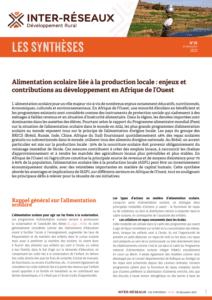In recent years, especially since the agriculture prices spike in 2008 that sparked ‘food riots’ across Africa, Asia and Latin America, a growing consensus has emerged on the need for proceeding to major changes in agricultural and food systems in order to ensure that the world can feed itself, today and in the future, with healthy and nutritionally high-quality food, while contributing to eradicating poverty, preserving biodiversity and natural resources, mitigating and adapting to climate change in a resource-constrained world : business as usual is no more an option. Within this context, the notion of scaling-up agroecology benefits from an increasing international recognition. La Via Campesina (LVC), the largest peasant movement worldwide, is strongly advocating for it, along with many other civil society actors including hundreds of non-governmental organizations (NGOs) in Africa, Latin America and A sia which have been promoting thousands of agroecological projects since the early 1980s. The United Nations Special Rapporteur on the Right to Food, Olivier De Schutter, has compiled evidence demonstrating not only that agroecological approaches can provide enough food for all, but that small-scale farmers can double food production within 10 years in critical regions by using agroecological methods. A growing number of scientists work in this field and in 2008, the International Assessment of Agricultural Knowledge, Science and Technology (IAASTD), a major four-year study involving 400 experts from all regions as well as international organizations including the Food and Agriculture Organization of the United Nations (FAO), the World Bank and the United Nations Environment Programme (UNEP), whose findings have been approved by 58 governments, called for a fundamental paradigm shift in agricultural development and an increase of agroecological science and practice. In its Trade and Environment Review 2013, the United Nations Confere nce on Trade and Development (UNCTAD), entitled Wake up before it is too late. Make agriculture truly sustainable now for food security in a changing climate, also made a strong case for scaling-up agroecology. Drawing from many other studies and global assessments, the evidence and results speak for the mselves as to the credibility of scaling-up agroecology for helping the world to feed itself sustainably today and in the future (see Part II). Notwithstanding, reinvestment efforts in agriculture since 2008 have been channeled into a slightly modified version of the Green Revolution, and little attention has been paid to the most cutting-edge ecological farming methods – methods that improve food production and farmers’ incomes, while also protecting the soil, water, and climate. UNCTAD’s Trade and Environment Review 2013 says much the same thing: “we neither see the necessary level of urgency nor political willingness for drastic change. Priority remains heavily focused on increasing production (mostly under the slogan “more with less”). The currently pursued approach is still very much biased towards expansion of “somewhat-less-polluting” industrial a griculture, rather than more sustainable and affordable food in rural areas”.
The paper includes four main parts:
- Part I explains what agroecology is, situating it in light of peasant and industrialized agricultures and introducing its three interconnected dimensions as a science, an agricultural approach and a movement. It also introduces differences between the agroecological paradigm and the model of sustainable intensification of agriculture, and summarizes key elements for understanding the implications of promoting one paradigm above the other. At last, it introduces the discussion on the technical feasibility of applying agroecological principles to large-scale industrial farms;
- Part II clarifies how scaling-up an agroecological transition can contribute to achieving sustainable agricultural and food systems;
- Part III identifies the main challenges to be met for scaling-up at a higher stage agroecological approaches;
- The conclusion formulates recommendations that help in addressing major challenges involved in scaling up agroecological approaches.







